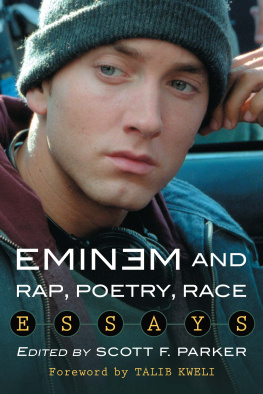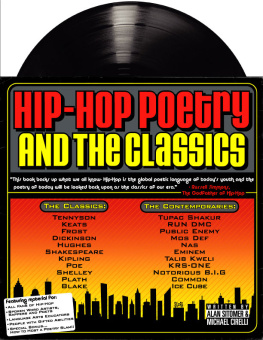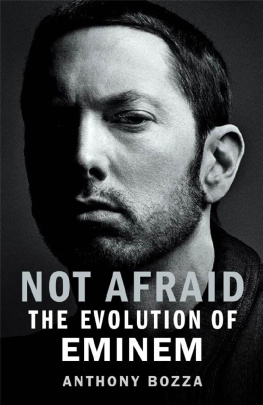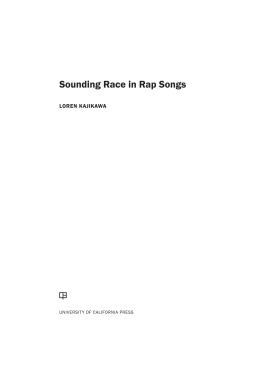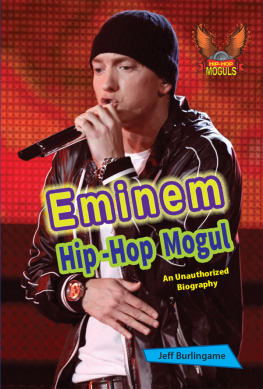Eminem - Eminem and rap, poetry, race : essays
Here you can read online Eminem - Eminem and rap, poetry, race : essays full text of the book (entire story) in english for free. Download pdf and epub, get meaning, cover and reviews about this ebook. year: 2014, publisher: McFarland, genre: Politics. Description of the work, (preface) as well as reviews are available. Best literature library LitArk.com created for fans of good reading and offers a wide selection of genres:
Romance novel
Science fiction
Adventure
Detective
Science
History
Home and family
Prose
Art
Politics
Computer
Non-fiction
Religion
Business
Children
Humor
Choose a favorite category and find really read worthwhile books. Enjoy immersion in the world of imagination, feel the emotions of the characters or learn something new for yourself, make an fascinating discovery.
- Book:Eminem and rap, poetry, race : essays
- Author:
- Publisher:McFarland
- Genre:
- Year:2014
- Rating:5 / 5
- Favourites:Add to favourites
- Your mark:
- 100
- 1
- 2
- 3
- 4
- 5
Eminem and rap, poetry, race : essays: summary, description and annotation
We offer to read an annotation, description, summary or preface (depends on what the author of the book "Eminem and rap, poetry, race : essays" wrote himself). If you haven't found the necessary information about the book — write in the comments, we will try to find it.
Eminem: author's other books
Who wrote Eminem and rap, poetry, race : essays? Find out the surname, the name of the author of the book and a list of all author's works by series.
Eminem and rap, poetry, race : essays — read online for free the complete book (whole text) full work
Below is the text of the book, divided by pages. System saving the place of the last page read, allows you to conveniently read the book "Eminem and rap, poetry, race : essays" online for free, without having to search again every time where you left off. Put a bookmark, and you can go to the page where you finished reading at any time.
Font size:
Interval:
Bookmark:

Gilbert B. Rodman
End of the world: Best rappers white, best golfers black.
Chris Rock
Describing the work on race and racism done at the Centre for Contemporary Cultural Studies at the University of Birmingham in the 1970s, Stuart Hall writes:
We had to develop a methodology that taught us to attend, not only to what people said about race but to what people could not say about race. It was the silences that told us something; it was what wasnt there. It was what was invisible, what couldnt be put into frame, what was apparently unsayable that we needed to attend to.
As Hall explains it, the Birmingham School took this particular turn because they came to recognize that analyzing media texts in order to identify and critique the ways that people of color were routinely misrepresented, stereotyped, and demonized was simply not an effective way to struggle against racism. The problem here is not that media representations didnt matter in the United Kingdom thenor that they dont matter in the United States today. On the contrary, people of color continue to be regularly depicted as dangerous criminals who threaten to destroy the existing social order; as exotic primitives to be feared, despised, and controlled; as helpless children dependent on charity from the technologically superior West; and as fetishized objects readily available for white appropriationand as long as images like these remain in heavy circulation, its vital that cultural critics continue to identify and critique them.
But its also not enough. Implicit in the focus on bad representations, after all, is the notion that enough good representations will solve the problem. Perhaps the clearest example of the fundamental flaw in this philosophy can be found in The Cosby Show. Although Cosby presented a far more uplifting public image of black people than had previously been the norm on U.S. television, those kinder, gentler fictions didnt translate very well into better living conditions for real black people. In fact, the widespread popularity of Cosby may actually have made it easier for large segments of white America to believe that the Huxtables upscale lifestyle was more representative of black America than was really the case, which, in turn, suggested that there was no longer a socio-economic gap of any real significance between white and black Americaor, more perniciously, that if such disparities did exist, it was because poor blacks had failed to live up to the impossibly picturesque example of Cliff and Claire and their designer-sweater-wearing children. Whats ultimately at issue here is not the (in)accuracy of Cosbys representations of black Americaafter all, its not as if sitcoms about white families provide us with consistently faithful reflections of white America eitherbut rather what is not represented: in the absence of a range of images of black people at least as broad and varied as the standard prime time depictions of whites, any single program, no matter how positive or enlightened or uplifting, carries a representational burden that it cant possibly bear in full.
Following Hall, then, I want to suggest that racism, as it currently lives and breathes in the United States, depends at least as much on the gaps in contemporary public discourse on race as it does on flawed media representations of people of color. There are, of course, more of these silences than I can do justice to in this essay, and so I wont say as much here as I might about how the national conversation on race (such as it is) frequently uses racially coded language (crime, welfare, the inner city, etc.) that studiously avoids explicit references to race; or how diligently that discourse steers clear of addressing the actual question of racism; or how, when racism is actually acknowledged, its too often reduced to a matter of individual prejudice and bigotry, rather than recognized as a set of systematic and institutional discriminatory practices. As important as these silences are, my concern here is a different sort of gap in mainstream U.S. discourses on race: the one that transforms the common, pervasive, and age-old phenomenon of racial blending (in its multiple and various forms) into something invisible, aberrant, and novel.
For instance, the notion that race is a historical invention (rather than a biological fact)and the corollary notion that racial categories are fluid and variableis neither recent news nor an especially controversial idea among scientists and scholars who study race. Similarly, men and women from different racial groups have come together (even if such unions have not always been characterized by mutual consent) to produce mixed race babies for centuries. Yet it wasnt until the 2000 census that the U.S. government officially recognized that check one box only is an awkward instruction for many people to follow when asked to identify their race.
The phenomenon of cultural exchange between different racial populations also has a long and tangled history, but such exchanges are still often treated as if they were a dangerous new phenomenon. This is especially true in cases where the borrowing that takes place is recognizably more about love than theft: where whites take up black styles, forms, and/or genres, not to claim them as their own nor to transform them into something universal (and thus something dehistoricized, decontextualized, and deracinated), but in ways that suggest genuine respect forand even deference towardblack culture. Arthur Jafa maps out a historical trajectory of such reverent borrowing that encompasses the influence of African sculpture and photography on Picassos invention of Cubism, improvisational jazz on Jackson Pollocks abstract painting, and rhythm and blues (R&B) on Elvis Presleys early brand of rockabilly:
In each of these instances, and despite the seemingly inevitable denial that occurred once influence became an issue, the breakthrough nature of the work achieved was made possible by an initially humble, and thus by definition nonsupremacist, relationship to the catalytic artifact at hand. Just as Beethoven was humble in the face of the body of work that had preceded him, these artists were each students of the work under whose influence they had fallen, students in a fashion which white supremacy would typically make unlikely.
The seemingly inevitable denial that Jafa mentions is the discursive move that tries to reclaim the art in question as a fundamentally white phenomenon that can be embraced by the dominant culture without any acknowledgment of the aesthetic and cultural miscegenation that originally gave rise to it.
This essay focuses on a contemporary example of reverential cultural borrowing: hip-hop superstar Eminem and the public controversies that swirl around him. As a white man working in a musical idiom dominated by black aesthetic sensibilitiesand who does so without trying to evade or denigrate the black gatekeepers who are the genres primary critical arbitratorsEminem poses a significant threat to the cultures broader fiction that this thing we call race is a fixed set of natural, discrete, and non-overlapping categories. And its this facet of Eminems stardomhis public performances of cultural miscegenationthat is the unacknowledged issue hidden at the core of the various moral panics around him.
Why is it that the only forms of popular culture that apparently have some sort of direct effect on audiences are the
Next pageFont size:
Interval:
Bookmark:
Similar books «Eminem and rap, poetry, race : essays»
Look at similar books to Eminem and rap, poetry, race : essays. We have selected literature similar in name and meaning in the hope of providing readers with more options to find new, interesting, not yet read works.
Discussion, reviews of the book Eminem and rap, poetry, race : essays and just readers' own opinions. Leave your comments, write what you think about the work, its meaning or the main characters. Specify what exactly you liked and what you didn't like, and why you think so.

